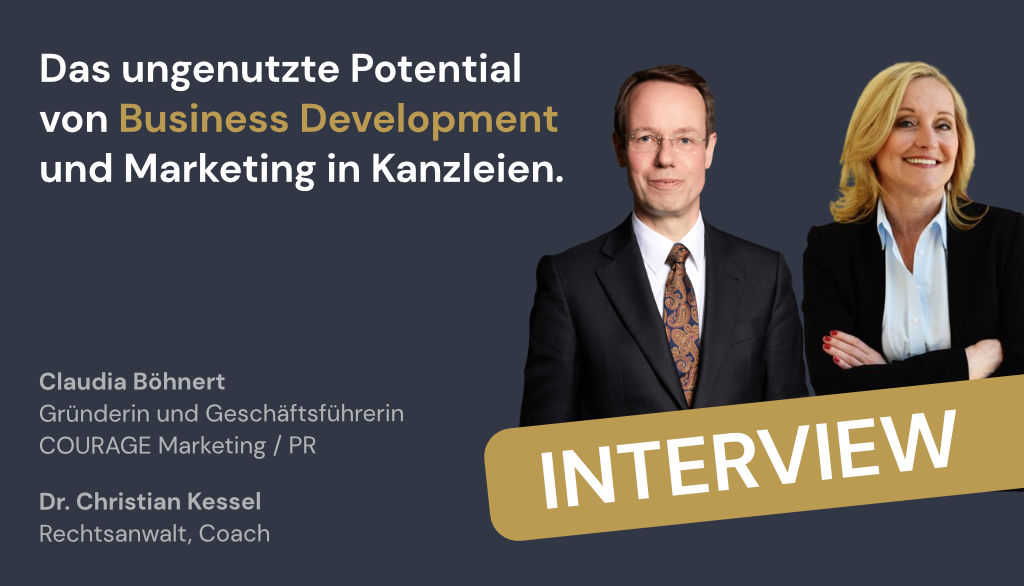Some basics for personal development to become a successful business developer:
• What is business development?
• How to develop a successful business development strategy
N.B.: This is a slightly amended version of a series of articles for a German digital legal periodical (Deutscher AnwaltSpiegel – www.deutscheranwaltspiegel.de) Therefore, it very much refers to business development in a law firm context. However, all principles set out and all examples mentioned apply directly or by analogy to all other professional services providers as well.
“In law school they do not teach you that a large percentage of the job is business development. No one is trained in this area and you have to learn on the job.”
(40-49-year-old female nonequity partner, Law360 Pulse Satisfaction Survey, “What attorneys really think about their profession”)
1. Kinds of business development in a law firm
How true! In Germany (and many other countries), too, this can only be emphasized. Neither at university, law school or in legal traineeships nor in most law firms you learn effective, efficient and ultimately successful business development. There are many reasons for this. Often it is simply because partners do not train their young colleagues in this area and there is no real “culture on business development” neither in teams nor in law firms. Business development is also often equated with marketing ( by the marketing team and not the lawyers) and social media activities.
Business development is much more than commonly assumed
However, business development is much more, goes much deeper, and is much more comprehensive than it is commonly understood or perceived. A successful business developer has special qualities – but they don’t have to be innate, they can all be learned so that we can all become successful in the field of business development, all the way to becoming real rainmakers.
How business development is often understood
Business development has many different meanings in practice. To give two typical examples:
Any law firm event to which clients and contacts are invited is generally considered business development. To the extent that this results in new work, this is certainly correct. In general, however, it only reaches existing clients or a target audience (potential clients) with whom contact already exists.
Cross-selling within a law firm is also referred to as business development. Of course, it requires initiative, effort and possibly stamina to “sell” a partner or an entire team in another area of law or for another industry sector, and any such referral is, of course, an important tool for generating new business and generating opportunities for growth. The only thing is: it does not win a new client on the market.
Various business development measures can therefore certainly generate new work, but they do not usually help to sustainably increase the volume of self-generated business. However, the latter is necessary below the partner level for one’s own business (partner) case and indispensable, at least for the young partners, in order to expand the business and become successful business developers and “successful partners” in the medium term.
My definition of business development
My understanding of successful business development is broader and aims at becoming successful in the market with regard to the acquisition of new high-yield clients and ideally at becoming rainmakers. For me, this is the gold standard for successful business development strategies and, in my opinion, and experience, achievable for everyone.
“Normal” recommendations for business development strategies are often insufficient
In practical terms, there is plenty of advice and recommendations for developing new business, exploring new markets or growth of the overall business. Taken on their own, however, many of these tips fall short. Anyone who wants to become an accomplished business developer or even a rainmaker needs more than just a few general hints and suggestions.
Best practice for business development
In my view, the best practice for successful business development first requires a clear vision for one’s own future (new) business or for the future focus of the intended own work. From this vision, a clear strategy must be derived (see II). Best practice also includes being active, determined and focused – “intentional” in other words (see IV). If necessary, obstacles in the law firm or in one’s own person or personality must be identified and overcome (see V).
2. Business Development Strategy
Any strategy is only as good as its underlying vision of what you want to achieve.
2.1. Vision: Identify long-term goals for business opportunities and growth
“No wind favors he who has no destined port.”
(Michel de Montaigne)
2.1.1 What is a vision?
The vision is highly personal and describes an inner image of the future, which I already have or am creating as a result of relevant considerations. It is the idea of how my business, my team, my network and ultimately my life should develop. The vision is at the same time inspiration, motivation and challenge. It defines the result of what I strive for or work towards. This result must have enough value and glow for me to pursue it continuously and consistently over a certain period of time, even long term, and to invest time, energy and, if necessary, also money. The vision also establishes the emotional connection to my commitment and lets me continue to pursue the vision even if I encounter resistance, if there does not seem to be enough time, the successes do not come quickly enough, or the work-life balance is (possibly even more) out of balance.
2.1.2 Relevant criteria for the development of a vision
There are a number of different questions anyone developing a vision needs to address:
- What excites me enough as an industry, area of law or niche to want to work and invest myself in it permanently?
- Will the chosen field generate affordable work? I.e. is there a market and are there targets for my focus/specialisation?
- Does my vision fit into my law firm? (If not, a change of law firm may also need to be considered.)
- Is my vision realizable, and with reasonable effort?
- How familiar am I already with the object of my vision?
- What is my product or service that distinguishes me from the competition?
- How do I develop a competitive advantage for myself in the market?
- Where does new business come from?
A swot analysis may help to identify answers to some of these questions; others require some very honest personal answers. Either way, if you do not find help among your friends or trusted colleagues or in your family, I highly recommend seeking external help from a coach or mentor (on the differences between the two of them please read my previous article Coaching vs. Mentoring, Consulting and Counselling)
2.1.3 Building the vision step by step
We must not be afraid of the size of the vision. If you are at the beginning of a career or a new career stage (e.g. after becoming a partner), you do not have to develop the entire vision up to the time of retirement. The vision – like the business as a whole – can evolve and grow or be written forth over time. To give an example: At my former firm, I built a market-leading legal team consisting of several partners and many counsels and associates to advise automotive suppliers on supply chain issues. However, it all started about 25 years earlier when, after a positive experience with one automotive supplier, I developed the vision of wanting to work for many automotive suppliers because I liked the type of work (complex contracts and expert opinions on recalls and field actions), the industry was commercially interesting and I got on well with the people in it. It was only much later that the broader and larger vision of building the market-leading team with a pyramid-like partner structure at all of my firm’s offices in Germany emerged – as it became reality (albeit more slowly and nowhere near as straightforwardly as I had envisioned). But the original vision gave me the initial inner drive to “chase after” a larger portfolio of automotive suppliers as clients.
2.1.4 The need for a vision
Without a vision, you will perish in the long run. Without a vision for an industry sector, a practice area or a legal or industrial niche that you want to serve and thrive in, and the corresponding specialization, successful business development is, in my opinion, unlikely.
Sadly I have often had to observe that despite the lack of a vision colleagues “worked through” the recommended business development measures; however, this was never as well received by potential clients ( for instance the target audience at a conference) as when colleagues were able to express their enthusiasm for an industry sector, their passion for a field of law or their joy in the niche with authenticity.
2.2. Business Development Strategy
Based on the vision, it is advisable to create a specific business development strategy (or business development plan)
2.2.1 A network of customers or clients
The simplest case of a strategy is to deliberately build up relationships with many individuals and ultimately a large target network of contacts in the expectation that sooner or later this will result in new business. This includes not only activities on LinkedIn and other social media, but also, among other things, “spreading” one’s own business cards or “collecting” as many business cards as possible from potential clients, especially at conferences or other events. However, it also includes maintaining all relationships so formed, developing first contacts with targets into genuine personal relationships, understanding and trust in each other (see also the next article).
For practice areas where sector specialization may be less relevant (for example, M&A), this may well be sufficient, although the general trend here is also towards ever greater specialization.
2.2.2 Precise and specific business development strategies
Therefore, as a rule, a well-thought-out and detailed, precise strategy is needed. This is all the more true, because the more strategically a business development plan is set out, the more efficient it will be.
The following questions can be helpful in developing a more sophisticated business development strategy:
- How do I get (deeper) into an industry sector?
- Where and how do I meet potential clients who are interested in my chosen industry sector and/or area of law?
- What business opportunities and resulting business growth do I foresee in my preferred/chosen market segment?
- What exactly is my target market for my envisaged strong business?
- How do I create a network of potential customers/clients?
- How do I build personal relationships within the networking actually?
- How do I position myself in the market in such a way that I am perceived as focused and later as specialized (thus becoming a “brand”)?
- Conversely, how can my targets when searching for a specialist on the market identify/find me?
- What would my “sales plan” and “sales process” look like?
- What strengths, weaknesses, opportunities and threats (swot analysis) can I identify and how do I address them?
- What market research is necessary? Do I have a business development team in my firm for it?
- How will I get referrals from the market?
- Is it sensible to distinguish between key business development and common business development? And accordingly to identify and concentrate on key targets?
- What day-to-day business development goals can I realistically set myself? Accordingly, what daily strategic plan should I develop?
- How do I manage the intended growth? Do I have enough team members? Does my firm have a good marketing team that can help?
2.2.3 Defining the target audience for my offerings
Strategy also includes considering whether to position yourself for a particular group of potential clients/customers in an industry sector or a particular legal field. Or for a particular legal product or service. For example, I chose automotive suppliers rather than manufacturers (OEMs) from the outset: because the latter saw my originally primarily contract law advice as their core competence and I could only hope for little business from them; because there were (and are) many more suppliers than OEMs; and because I did not have to fear any major conflicts of interest if I did not have OEMs as clients.
In addition, the strategy must also fit into the law firm’s environment. If a large number of OEMs had already been clients of the law firm, the criterion of lack of conflicts of interest (and possibly the entire strategy) would have been obsolete.
2.2.4 Skills: Developing or proving “street credibility”
When developing a strategy, it is also advisable to consider the following:
- How can I acquire as quickly and comprehensively as possible clearly identifiable skills, specializations and experience (“street credibility”)?
- How can I position myself effectively in the market?
- How do I gain a competitive advantage in the market?
To this end, it can be helpful to be known in your own law firm as being focused on one area and to ask to handle all cases arising in one area of law or in a certain industry segment. The firm’s management can also support such a goal, you can advertise this in the partner meetings as well as in direct personal conversations within the firm.
In the next article, we will look at the implementation of the strategy to fulfil the vision. In a further article, we will look at what it means to be “intentional” in business development and, in particular, to overcome internal challenges.






